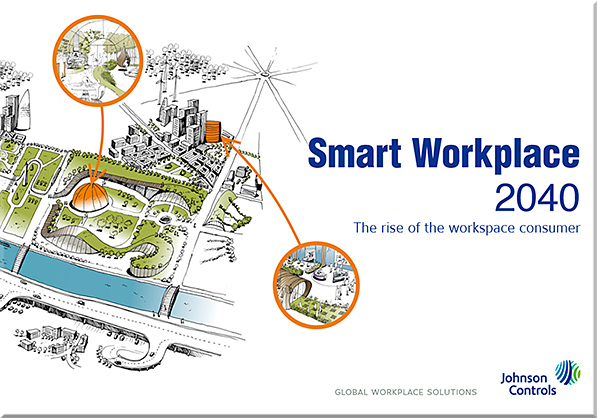New report lays out its 2040 vision of the workplace of the future — from workplaceinsight.net b
Excerpt:
By 2040 knowledge workers will decide where and how they want to work, according to a new report on the workplace of the future by Johnson Controls’ Global Workplace Solutions business. The Smart Workplace 2040 report claims that 25 years from now, work will be seen as something workers do, rather than a place to which they commute. According to the study, work patterns will be radically different as a new generation of what it terms ‘workspace consumers’ choose their time and place of work. Most workers will frequently work from home, and will choose when to visit work hubs to meet and network with others. There will be no set hours and the emphasis will be on getting work done, while workers’ wellness will take priority. Technology will bring together networks of individuals who operate in an entrepreneurial way, with collaboration the major driver of business performance.
Also see:
Smart Workplace 2040: The rise of the workspace consumer — from JohnsonControls.com
Executive Summary
Corporate organizations are still considering the workplace as delivering a strong identity and more than ever as a marketing weapon, creating and sustaining their corporate identity. The intensity of performance level improvements increased significantly over the past ten years, accelerating the pace of work through the combined power of technology and personalized, choice-based software solutions.
The presence of technology in every aspect of our life in 2040 is predominating our way of living. The workplace of 2040 is far more agile, the presence of technology is ultra predominant and human beings are highly reliant on it. Yet the technology is “shy”, not intrusive, transparent, and highly reliable – no failure is neither, not a possibility nor an option:
- The home (the Hive) is a hyper connected and adaptive, responsive to the environment and its users, supporting multiple requirements simultaneously
- Complex software applications will suggest to users what they should do to maximise performance, not miss any important deadlines, and make sure she allocates enough time for important tasks that are not necessarily urgent
- End user services are autonomous, proactive and designed around enhancing the user experience
- In an ubiquitously networked world, true offline time is both a luxury and a necessity. Being physically present is perceived as more authentic, a privilege
- Adaptive white noise technology makes it possible to have a first rate telepresence session in an open environment
- The whole DIY movement is experiencing a tremendous boost – people are literally building their own products, bought through their smartphones using mobile web applications, and printed on demand
- Lower costs of energy and unmanned vehicles in combination with high costs of owning your own vehicle, plus high parking costs in densely populated megacities, benefits new sharing regimes.
In the context of the new world of work in 2040, we are contemplating a new world of work in an Eco Campus:
While Corporate Soldiers still remain major actors in organisations, we are seeing a significant rise of entrepreneurial behaviours, transforming employees into a new breed of workers focused on achieving great results through their work activities as well as achieving wellbeing in their private life. Going to “work” is therefore accessible through a complex model of locations, spread across an Eco Campus, accessible less than 20 miles away from home…









